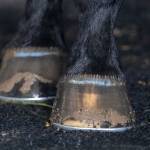Horse Hoof Health: Beyond Biotin

Key nutrients in hoof supplements include biotin, methionine, and zinc. Scientific studies have clearly shown the benefits of biotin supplementation. Horse owners often offer 15–20 mg of biotin day to improve hoof health.*
“Although many studies support biotin supplementation, research on other ingredients commonly included in hoof supplements is needed. It is important that owners realize dietary supplements are not a quick fix, and imbalances in the mineral content of a horse’s diet can wreak havoc on hooves,” said Peter Huntington, B.V.Sc., M.A.C.V.Sc, director of nutrition at Kentucky Equine Research (Australia).
Selenium is one mineral that must be carefully measured. Too little selenium can result in signs of deficiency (white muscle disease), whereas too much can cause signs of toxicity, such as poor coat and white line disease—a separation of the hoof wall between the middle and inner layers. The safety margin between too much and too little is much smaller for selenium than other minerals. As such, it is easy to run into problems balancing dietary selenium levels.
To maximize hoof health, the overall diet, environment, and genetics of the horse must be considered, including the following:
- Providing adequate energy but avoiding overconsumption of concentrates or lush pastures to cause laminitis (especially in easy keepers or those with insulin resistance or equine metabolic syndrome);
- Analyzing forage and scrutinizing all nutritional supplements offered to avoid oversupplementation and ensure a quality product is being offered;
- Providing routine farriery to catch hoof problems early and ensure deleterious mechanical stress—secondary to underrun heels or long toes, for example—are corrected quickly; and
- Offering daily exercise or turnout to promote blood flow to the feet.
For horses that need a higher level of hoof-related nutrients, Kentucky Equine Research offers Bio-Bloom PS (Bio-Bloom HF in Australia) to provide additional support for hoof quality and growth.
*Reilly, J.D., D.F. Cottrell, R.J. Martin, et al. 1998. Effect of supplementary dietary biotin on hoof growth and hoof growth rate in ponies: A controlled trial. Equine Veterinary Journal Supplement 26:51–57.








